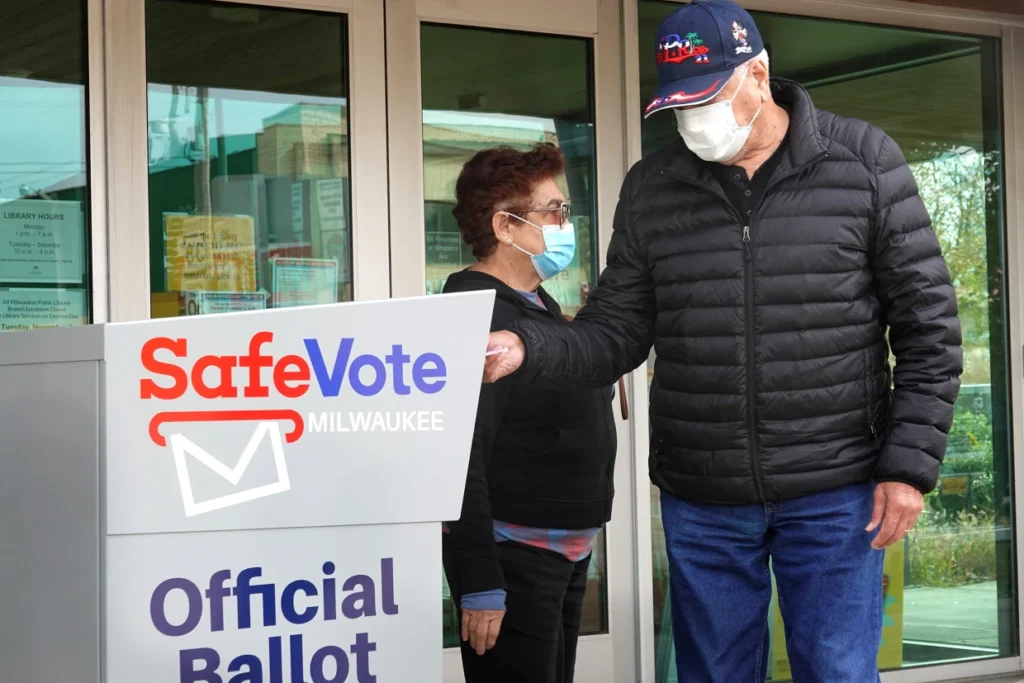The Wisconsin Supreme Court has made a pivotal decision, voting 4-3 to overturn a previous ruling that restricted the use of most ballot drop boxes in the state. This latest ruling is set to have significant implications for Wisconsin’s upcoming 2024 presidential election, potentially reshaping the landscape of how absentee ballots are handled in this crucial battleground.
In a statement issued on Friday, the court emphasized that their decision does not mandate the use of drop boxes by municipal clerks but rather affirms their lawful discretion to employ secure drop boxes as part of the electoral process.
The contentious issue has been a focal point of debate, particularly heightened during the COVID-19 pandemic in 2020, when Democrats advocated widely for the use of drop boxes to facilitate safe and accessible voting. Conversely, some Republicans have expressed concerns, albeit without substantiated evidence, linking drop boxes to alleged voter fraud.
The recent decision marks a reversal from a 2022 ruling that had limited drop box usage to election clerks’ offices, a decision that was challenged by Democratic groups, including Priorities USA. This legal battle underscored broader questions surrounding Wisconsin’s electoral laws and policies, particularly in the absence of explicit statutory guidance on drop box utilization.
The court’s composition has evolved significantly since the 2022 ruling, with a shift in majority favoring liberal justices who have now moved to revisit and overturn previous decisions they deemed as flawed or lacking in legal basis. This decision reflects a broader trend in legal challenges across various states, where judicial interpretations of voting rights and access continue to evolve amid changing political and social landscapes.
As Wisconsin prepares for another critical election cycle, the reinstatement of ballot drop boxes could potentially influence voter turnout and accessibility, prompting both parties to strategize around these new developments in the electoral process.
The court’s decision underscores its role in shaping the future of electoral practices in Wisconsin, emphasizing the importance of legal precedent and the evolving nature of voting rights in American democracy.
Georgia has implemented over 100 new laws, and several of these legislative changes will directly influence the upcoming November election.
The state has introduced new standards for polling places ahead of the November election.
Starting July 1, polling stations may reduce the number of voting machines based on expected turnout, a departure from previous requirements for a fixed number of machines at each site. Ware County’s Supervisor of Elections, Carlos Nelson, expressed support for this change, noting its flexibility in adapting to variations in voter behavior.
“This is a bill that elections supervisors and superintendents across the state advocated for because the previous law set a rigid standard of 250 voters per booth,” Nelson explained. “With many voters opting for early or absentee voting, actual turnout often does not align with these fixed numbers.”
Additionally, another new law grants poll workers enhanced access to the vote-counting process. It includes the implementation of watermarked ballots before scanning as part of heightened security measures.
After scanning, the Secretary of State is authorized to publish ballot images online to verify the integrity of the voting process, though these images will not contain personal voter details.
Nelson commented on the security measures, stating, “Whether it’s watermarked ballots or the previous standard security paper, elections in Ware County and across Georgia will remain secure.”
Georgia remains a pivotal battleground state in national elections. Despite President Biden’s victory in 2020, Democratic successes in Georgia have been rare since Bill Clinton’s win in 1992. However, confidence in the electoral process remains divided among voters.
According to a recent poll by the Atlanta Journal-Constitution, only 57% of Georgia voters are confident that the upcoming presidential election will be conducted fairly and accurately, with 43% expressing doubts.
Nelson acknowledged the challenge of changing public perception: “People will believe what they want to believe. However, elections in Ware County and Georgia are conducted securely.”
Two additional changes stipulate that all poll workers must be U.S. citizens and allow for the removal of voters from registration lists if they pass away, register to vote elsewhere, or if tax exemptions indicate their primary residence differs from their voting location.
Nelson anticipated minimal impact from these changes on Ware County’s electoral processes.
As Georgia prepares for the forthcoming election cycle, these legislative adjustments underscore ongoing efforts to refine electoral practices and ensure the integrity of the democratic process across the state.


